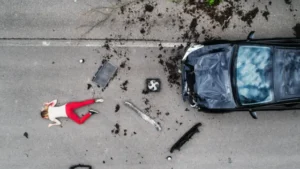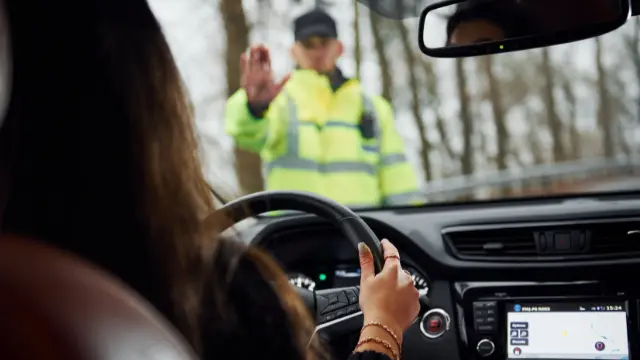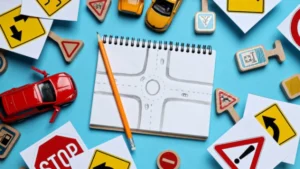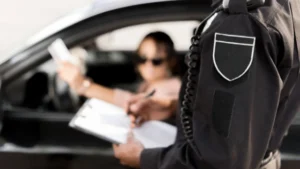

What is Careless Driving?
Picture this: You’re driving home, thinking about your long to-do list. You glance at your phone for a second, and when you look up, you have to slam on the brakes to avoid hitting the car in front of you. The police pull you over, and suddenly, you’re facing a careless driving charge.
Careless driving laws exist to promote traffic safety and prevent accidents caused by inattention or minor negligence. While not as severe as reckless driving, careless driving can still lead to fines, points on your license, and increased insurance rates. Understanding your legal rights and possible defenses is essential if you are facing a negligent driving charge.
Negligent Driving: How It Differs from Reckless Driving
Negligent driving refers to operating a vehicle in a way that lacks reasonable caution, even if there was no intent to cause harm. While careless driving and reckless driving are sometimes used interchangeably, they have key differences:
- Careless Driving: Generally classified as unintentional negligence, such as failing to signal, drifting between lanes, or not adjusting speed for road conditions.
- Reckless Driving: Involves willful disregard for safety, such as excessive speeding, aggressive swerving, or running red lights.
For example, if a driver fails to check their blind spot and sideswipes another vehicle, they might be charged with careless driving. However, if a driver is weaving in and out of traffic at high speeds, they could face a reckless driving charge.
Traffic Safety and the Consequences of Careless Driving
Careless driving laws exist to protect all road users, including drivers, passengers, cyclists, and pedestrians. According to the National Highway Traffic Safety Administration (NHTSA), driver error contributes to over 90% of traffic accidents. Common causes of careless driving include:
- Distracted driving – Using a phone, eating, or adjusting the radio.
- Fatigue – Driving while drowsy or not paying full attention.
- Failure to yield – Not giving the right-of-way to other vehicles or pedestrians.
- Following too closely – Tailgating, which reduces reaction time.
Careless driving may not always lead to an accident, but it increases the risk of crashes, prompting law enforcement to issue citations to prevent dangerous situations from escalating.
Legal Consequences of Careless Driving
The penalties for careless driving depend on state laws and the severity of the offense. A typical first-time careless driving charge can result in:
- Fines ranging from $100 to $1,000.
- Points on your license (varies by state, often between 2-4 points).
- Increased insurance premiums.
- Mandatory traffic school or defensive driving courses.
If a careless driving offense results in an accident with injuries or property damage, the driver may face:
- Higher fines.
- Civil liability for damages.
- Suspension of driving privileges in severe cases.
In Florida, for example, a careless driving citation carries a fine of $160 and adds 3 points to the driver’s license. If careless driving results in an accident, the penalties increase.
Sentencing Factors for Careless Driving
Several factors can influence the severity of sentencing in a careless driving case. Judges consider elements such as:
- Driving History: First-time offenders may receive lighter penalties, while repeat violations could lead to harsher fines or license suspension.
- Accident Involvement: If careless driving causes a crash, penalties increase significantly.
- Speeding at the Time of the Offense: Driving even slightly over the speed limit while engaging in careless behavior can lead to additional charges.
- Presence of Minors in the Vehicle: If children were in the car, the driver may face enhanced penalties.
- Weather and Road Conditions: Driving carelessly in bad weather or dangerous conditions may be viewed more severely.
Judges may offer plea bargains, allowing drivers to attend traffic school instead of facing fines and points on their record.
Case Study: How One Driver Fought a Careless Driving Charge
Background
Rachel, a 29-year-old nurse, was driving home after a long shift when she briefly drifted into another lane. She quickly corrected her mistake but was pulled over and cited for careless driving. Facing a $300 fine and 3 points on her license, she decided to fight the charge.
Defense Strategy
Rachel’s attorney built a defense around the following points:
- Lack of Danger: No vehicles were directly impacted by Rachel’s brief lane drift.
- Fatigue Defense: As a nurse working overnight shifts, Rachel had a legitimate reason for momentary inattention.
- Challenging the Officer’s Observation: There was no dashcam footage to prove the alleged violation.
Outcome
Instead of a careless driving conviction, the judge agreed to reduce the charge to a non-moving violation, resulting in a lower fine and no points on her license.
Final Thoughts
A careless driving charge can have long-lasting consequences, but understanding your legal options can make a difference. If you have been cited for negligent driving, consulting an experienced traffic attorney can help reduce fines, protect your license, and keep your record clean.
Frequently Asked Questions (FAQs)
- Is careless driving considered a criminal offense? No, careless driving is generally treated as a traffic violation rather than a criminal offense. However, if it leads to severe accidents or becomes a repeated offense, the penalties can become more severe.
- Can careless driving affect my insurance? Yes, insurance companies may increase premiums after a careless driving conviction, as it indicates higher risk.
- How do I fight a careless driving ticket? Possible defenses include challenging the officer’s observations, proving lack of negligence, or negotiating for a lesser charge.
- Will I lose my license for careless driving? License suspension is rare for a first offense, but repeated violations or accidents may result in temporary loss of driving privileges.
- Can a careless driving charge be reduced? Yes, many courts allow plea deals, especially if the driver has no prior offenses. Completing a defensive driving course can sometimes help reduce penalties.



